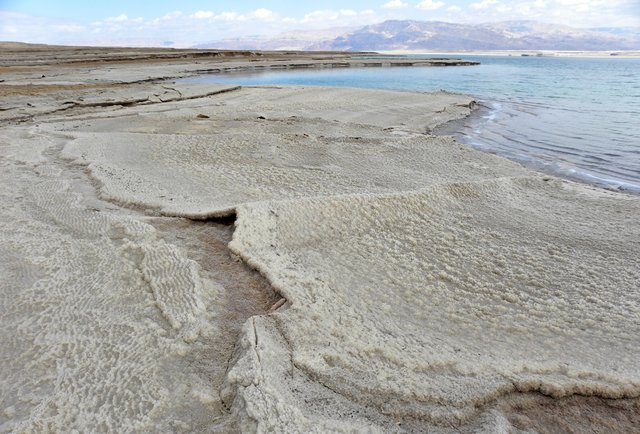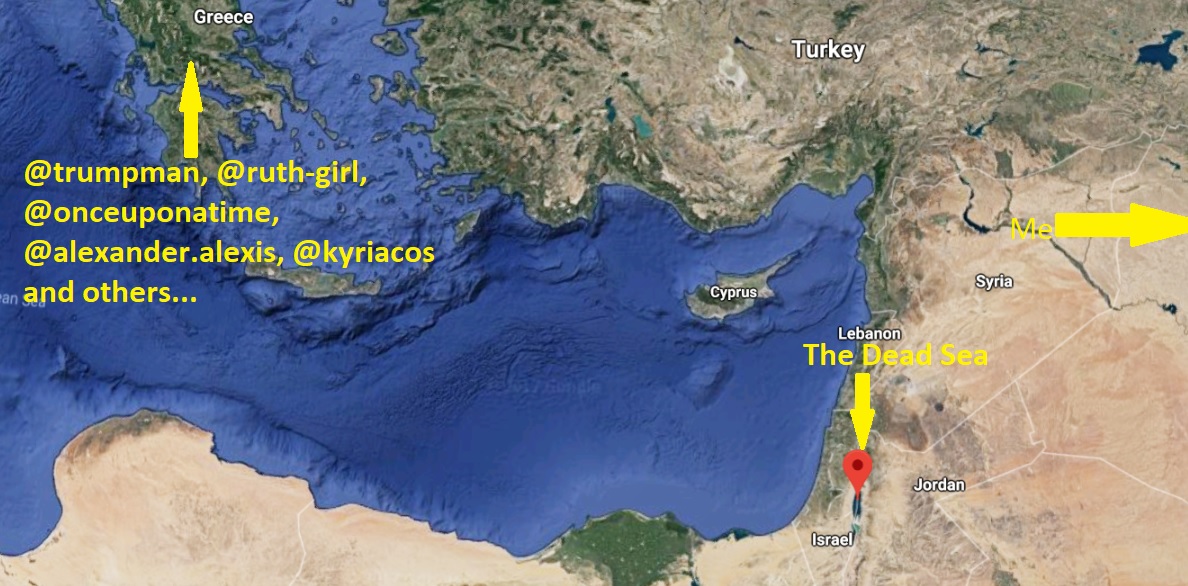
You know when scheming corporations find subtle loopholes in the system to avoid tax and maximize their existence? I feel like they got that idea from evolution.
It seems that whenever the Earth decides No Life Must Enter Here, life just kinda finds a tiny little loophole to slip through and does it anyway, with a usually microscopic little finger sticking it to the man (or woman, nobody knows what gender evolution is).
The Dead Sea

That's right, I know where you live
Perhaps one of the most famous seas in the world for its somewhat unique property of being very, very salty. So salty that tourists can float on top without any effort of breath control. The salt also makes it very, very dangerous, and contact with your eyes could cause burning and blindness, so not many people go diving there - not that you'd see much anyway.
Fresh water could for the longest time enter the lake via the Jordan river, but selfish humans decided to cut off its supply so they got all the nice water. The only way out, however, is evaporation, which of course leaves all the salty goodness behind. The lake has been losing depth by about 4 feet every year as a result, and it's already pretty much the lowest place on Earth.
But even so, there is life down there - several different kinds!
What is there?
Now this is nothing new; life has been observed at the dead sea for many decades, with samples of bacteria found in mud from the bottom of the lake way back in 1943, and even two huge algal bloom events in 1980 and 1992 thanks to the halophilic algae Dunaliella salina and it'll probably happen again one day. These events gave the lake a deep red hue, which, given proximity, I'd guess is also why the Red Sea got its name. Feel free to look that up.
The Dead sea also has a very high magnesium concentration which would be deadly for any 'higher' form of life such as fish, if the high saline concentration wasn't enough. On top of that, life found in freshwater typically dies in salt water and vice versa, so a little spring of fresh water, quickly mixing with the salt doesn't sound particularly hospitable - it's either one or the other.
Well, apparently not.
Bacteria
In 2011, a bunch of adventurous researchers decided to take the plunge and risk diving into the murky, deadly water with 40kg weights attached to them to help them sink. It was time to figure out what was going on down there. You can watch their voyage here:
If you skip to about 2:30, you can see this:

Doesn't look like much but it's actually pretty astonishing and significant. See that little film of white gunk at the bottom of the rock? That's sulfur-eating bacteria, thriving at the bottom of the rocks around the freshwater springs. But this wasn't the only find. They found green films of photosynthesizing bacteria on the tops of rocks, too that thrived on both sulphide and sunlight.
Both are evidently fine with fluctuations of salt-fresh water mixes in their environment which was until then completely unheard of.
What else - Archaea
Well as I stated in an earlier post, where there's bacteria, there's Archaea. Archaea are a whole different domain of their own that typically thrive in the most extreme conditions, and Haloarcula marismortui is no exception to that. This archaeon lives in shallow, high-sunlight areas of the lake and thus is exposed to a lot of UV radiation that would normally dismantle the proteins and DNA within a living organism. Not for ol' Marismortui! In fact, about 1,000 to 10,000 of these archaea survive in each ml of lake, which is actually quite small in the grand scheme of things, but respectable in context.
With all that in mind, this organism is the subject of plenty of research involving tolerance to UV radiation, the stability of proteins and other biotechnological research you can read more about below.
What else - Fungus
Not to be left out, fungus decided to give life here a shot. There may already be a plethora of microbial life, but the competition here is far less than out in the jungles, so it's kind of prime real estate for some. I guess it depends on your priorities.
But as of 2015, research seems to show that only two fungal species have survived there, down from 34 fifteen years ago, possibly due to the way the lake is rapidly drying up. Diversity on the whole has declined substantially here, but for the two surviving fungi, Aspergillus amstelodami and Aspergillus ruber, they have managed to adapt quite well to this hypersaline lifestyle, and have in fact dominated the landscape with an increase of frequency in all locations but the most extreme.
But there's another fungal player in town found by separate research; Eurotium rubrum which demonstrates an active counteraction against the stress of salinity in its metabolic responses, and 'many of its genes encode for proteins with a significantly higher proportion of acidic amino acid residues'. This turns out to be an example of convergent evolution - the process of completely separate species under similar stress evolving the same techniques and solutions to survive.
So, it's all very small, but life as usual finds a niche and exploits it for all it's worth.
What's next for life in the Dead Sea?

Realistically, all this life will be gone in a few decades when the sea stops existing, replaced by some salty-loving landlubbers, and though many are unique to the Dead Sea, they are extremophilic enough to easily be contained in jars or other hypersaline lakes around the world. Then again, lakes are hypersaline precisely because they're drying up so that's probably not a long term goal for the little guys.
Then again, perhaps those fresh water springs will continue to keep at least a few centimeters of life-bearing water, in which I'm sure millions of bacteria, archaea and fungi will happily reside. Good luck, guys!

All Images CC0 Licensed
References: Bacteria in the Bottom Sediments of the Dead Sea, 1943 | Genome sequence of Haloarcula marismortui: A halophilic archaeon from the Dead Sea | Haloarcula Marismortui | Fungal biodiversity in the hypersaline Dead Sea: extinction and evolution | BGU and German Researchers discover Freshwater Springs and New Life-forms in the Dead Sea | Genomic adaptations of the halophilic Dead Sea filamentous fungus Eurotium rubrum
Well written article about dead sea. I was thinking to visit dead sea when I was small because I can float on the sea although I don't know how to swim (awesome ideas for a kid haha) Now only I know the concentration of dead sea is very high until it is life-threatening. Learnt something through your post
Downvoting a post can decrease pending rewards and make it less visible. Common reasons:
Submit
Well yeah just don't drink it or go diving under it and you'll be fine!
Downvoting a post can decrease pending rewards and make it less visible. Common reasons:
Submit
Another species of life form would spring up to rock the saline rich ground. It seems the spammers are out for your post today. I can see their signature all over the comment section.
Downvoting a post can decrease pending rewards and make it less visible. Common reasons:
Submit
Haha yeah, but hey it makes it look like people are engaging!
Downvoting a post can decrease pending rewards and make it less visible. Common reasons:
Submit
I agree they make for an interesting comment section.
Downvoting a post can decrease pending rewards and make it less visible. Common reasons:
Submit
Is it conceivable that it will dry totally, or will the hydroscopic properties of the salts prevent this?
Downvoting a post can decrease pending rewards and make it less visible. Common reasons:
Submit
Oops forgot to reply! I'm confident that it can and probably will dry up totally. I think you mean hygroscopic, but that wouldn't prevent a drying up - numerous salty, trapped lakes have already vanished this way. I'm no expert though!
Downvoting a post can decrease pending rewards and make it less visible. Common reasons:
Submit
Hmm... I sure watched the video for about 4 times, that sea ain't dead. It looks like a different world on it's own. I think I saw some caves or am I wrong...??
Downvoting a post can decrease pending rewards and make it less visible. Common reasons:
Submit
That looks like the fresh water springs to me, but could also be caves!
Downvoting a post can decrease pending rewards and make it less visible. Common reasons:
Submit
Hmm.. I trust your judgement anyway...
Downvoting a post can decrease pending rewards and make it less visible. Common reasons:
Submit
Nice piece on the dead sea buddy. I heard a story about the dead sea, that you can lie down afloat it without sinking. Don't know it it's true though :).
P.S: When dead sea stops to exist, I guess that area would be re-named to dead area
Downvoting a post can decrease pending rewards and make it less visible. Common reasons:
Submit
Haha this is the most well known thing about the dead sea, you are not teaching me something here! As I stated in the article, the divers needed to add 40kg weights just to get under the water!
Downvoting a post can decrease pending rewards and make it less visible. Common reasons:
Submit
Lol.
My friend weighs 200kg, does he still need additional weight to get under the water? :)
Downvoting a post can decrease pending rewards and make it less visible. Common reasons:
Submit
I think the last thing he needs is additional weight
Downvoting a post can decrease pending rewards and make it less visible. Common reasons:
Submit
wow this is awesome should visit this place once in my lifetime. i wanna go here, am adding this to my bucket list
Downvoting a post can decrease pending rewards and make it less visible. Common reasons:
Submit
Yeah that area is probably worth a visit in general, for political intrigue if nothing else =D
Downvoting a post can decrease pending rewards and make it less visible. Common reasons:
Submit
Very informative post. It's a shame that the future of the Dead Sea is very bleak. I had the opportunity to visit it last summer and it really is a unique experience/place. Thanks for the content
Downvoting a post can decrease pending rewards and make it less visible. Common reasons:
Submit
Oo good point I should get there before 2050... well, before I die I suppose. It's a slow death.
Downvoting a post can decrease pending rewards and make it less visible. Common reasons:
Submit
Before you were born I went swimming in the dead sea (well floating - its actually quite difficult to swim in as your legs keep surfacing the water). I can remember two things
Happy days..
Downvoting a post can decrease pending rewards and make it less visible. Common reasons:
Submit
I think somewhere in the past I vaguely recall being told about you being there! I've always just kinda known either way. I sure don't miss the days where shaving involved multiple cuts to the face... eesh. Then again I still can't grow a proper beard anyway so what do I know
Downvoting a post can decrease pending rewards and make it less visible. Common reasons:
Submit
Life thrives anywhere there is an opportunity to do so. I think thats what nature has in its uniqueness!
I feel it should be named dying sea
Downvoting a post can decrease pending rewards and make it less visible. Common reasons:
Submit
That actually sounds cooler too, good idea!
Downvoting a post can decrease pending rewards and make it less visible. Common reasons:
Submit
Downvoting a post can decrease pending rewards and make it less visible. Common reasons:
Submit
Downvoting a post can decrease pending rewards and make it less visible. Common reasons:
Submit
Downvoting a post can decrease pending rewards and make it less visible. Common reasons:
Submit
Downvoting a post can decrease pending rewards and make it less visible. Common reasons:
Submit
Downvoting a post can decrease pending rewards and make it less visible. Common reasons:
Submit